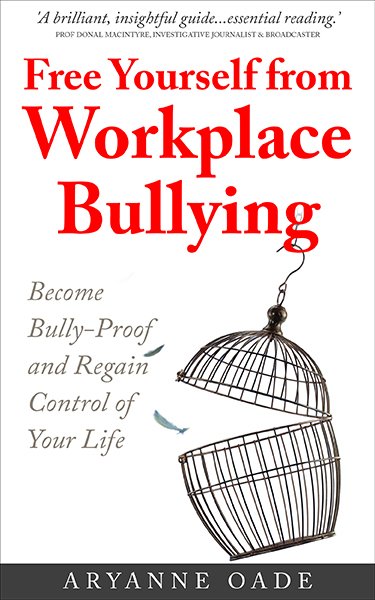How Team Members Target Their Managers and What to Do About It
By Aryanne Oade
Many team members who bully upwards do so because they have unresolved authority issues in their lives. They fear or dislike authority on principle and for emotionally derived reasons, and allow this unresolved issue to create the impetus to bully their bosses. A bullying team member is motivated to oppose their manager or supervisor’s aims, or their authority, not because they have thought about the issues and happen to arrive at a different view to theirs. They oppose for emotionally derived reasons because they want to.
This article examines the dynamics involved when a member of a team successfully targets a manager or supervisor in a campaign of workplace bullying. The article will explore the dynamics which play out between the manager or supervisor and the bullying team member during the campaign of workplace bullying by focusing on:
- Issues in the life of the manager or supervisor which result in them having a hard time owning their organisational authority in the moment of an attack.
- Tactics bullying team members may employ to oppose their bosses.
- Steps a manager or supervisor can take to assert their right to manage their bullying team member.
Issues in the Life of a Manager or Supervisor who is Successfully Targeted
Managers or supervisors who are successfully targeted by their more junior colleagues often have a complicated relationship with their own authority. When a member of their team is willing to take direction from them, they are often able managers: they are comfortable setting direction, seeking influence and giving feedback. But in the unusual situation that a member of their team does not respect their authority, they can have a hard time doing any of these things effectively and can be especially reluctant to assert their right to manage. Why do they back off in this way?
Very often, the manager or supervisor correctly discerns that the battleground between them and their team member is their authority. And, in the moment of an attack, they step away from asserting that authority because they fear that to continue to manage their assailant will result in their team member reacting with even greater abuse. The manager feels intimidated, and is not able to draw a clear boundary around the disrespectful, abusive behaviour of their team member. Their choice is not to assert their authority in a well- meaning but misguided attempt to prevent escalating conflict, a strategy which works against their best interests in the long run as it leaves the way clear for their team member to continue to bully them.
Many managers are thrown by the degree of disrespect their bullying team member demonstrates for them and their authority. Some bullies who bully upwards can employ a degree of animosity which is overwhelming and which results in the manager not knowing quite what to do about it.
Tactics Bullying Team Members May Employ to Oppose their Bosses
Tactics which bullying team members may employ to demonstrate their opposition towards their boss may take the form of:
- Blocking progress on tasks or processes for which they are responsible in the hope that their failure to complete their work on time will somehow cause trouble for their boss.
- Refusing to co-operate with their boss’s wishes or instructions so that they can thwart them.
- Saying ‘it won’t work’ in response to a plan or proposal put forward by their boss, and refusing to budge without explaining why.
- Generating other plausible-sounding ‘reasons’ why certain actions cannot be taken, none of which is actually true, simply to oppose their boss.
- Reacting with irritation, frustration or downright anger whenever their manager attempts to manage them.
So why would a team member target their boss in this way? Team members who bully upwards often have authority issues. They may like their manager as a person, and may be quite comfortable chatting informally with them at work. But as soon as the discussions move onto work topics, and involve an attempt by their manager to manage them, the upwards bully starts to oppose.
Every upwards bully will have a unique personal context for their decision to bully their boss. However, it is likely that the bully’s disrespect for their manager – and consequent aggression towards them – has its genesis in the unresolved authority issues in the bully’s life. The bully makes their boss’s authority the battleground between the two of them but, actually, the real issue they are struggling with lies within their own personal history. Their true need is to safely process the unresolved anger they feel towards prior authority figures, so that they can interact with their manager and other current workplace authority figures from a clean space.
Steps a Manager or Supervisor Can Take to Assert their Right to Manage their Bullying Team Member
Although the manger or supervisor may be tempted to give in and relinquish their authority to the bully in order to keep the peace, this is a counter-productive tack to take. While a bullying team member may want to oppose their boss’s authority and remove power from them, what they need is for their boss to hold the boundary as their authority figure, even under pressure. It is important that the manager continue to assert their right to manage the bully, especially in the moment of an attack, and doesn’t fall into the trap of surrendering that authority to the bully during these encounters.
The bully’s disrespect for them and their authority will not burn itself out over time. It needs to be confronted using a calm and non-evaluative manner, every time the bully employs an actively aggressive or a passively aggressive tactic. The most effective way to do this is to continue to manage the bullying team member by giving them feedback, requiring them to perform to standard, challenging their abusive words, confronting their active aggression, and inviting them to use open and transparent behaviour instead of passive aggression.
Your overall aim is to challenge the bully, repeatedly if necessary, until they re-evaluate their prejudiced view that all workplace authority is dangerous or worthy of contempt, realise that it is they who have a pressing need to address their development needs, and choose to respect their boss’s authority.
This is the last of three articles in a series on bullying behaviour in the workplace.

 Aryanne Oade has worked as a chartered psychologist for over twenty years. She coaches clients to recover from the debilitating effects of workplace bullying, and to re-discover their energy and enthusiasm. Aryanne is the bestselling author of seven books. www.oadeassociates.com
Aryanne Oade has worked as a chartered psychologist for over twenty years. She coaches clients to recover from the debilitating effects of workplace bullying, and to re-discover their energy and enthusiasm. Aryanne is the bestselling author of seven books. www.oadeassociates.com
The article contains extracts from Chapter 7 of Aryanne’s latest best-selling book: Free Yourself from Workplace Bullying: Become Bully-Proof and Regain Control of Your Life. Visit www.minthallpublishing.com to order paperback copies at a discount, or buy smaller quantities and the eBook from online retailers.
What makes us susceptible to burnout?
In this episode of the Safety & Health Podcast, ‘Burnout, stress and being human’, Heather Beach is joined by Stacy Thomson to discuss burnout, perfectionism and how to deal with burnout as an individual, as management and as an organisation.
We provide an insight on how to tackle burnout and why mental health is such a taboo subject, particularly in the workplace.




Readers who would like to explore issues around workplace bullying further can download a range of free audio and written resources on detoxifying and recovering from bullying, learning to become bully-proof and handling adversarial behaviour at work:
http://www.oadeassociates.com/downloads/
Great Articles. Please watch Work Under Pressure,
my personal story of the effects of bullying.